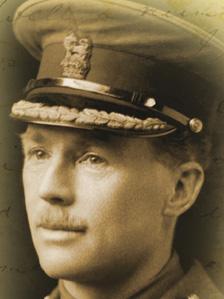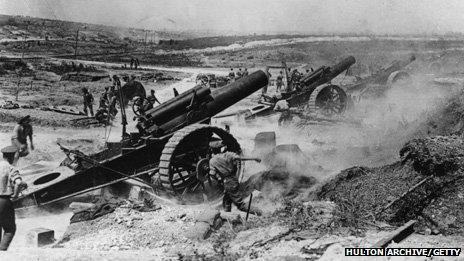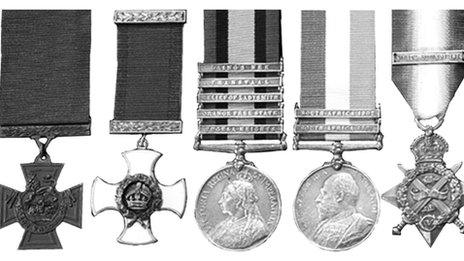World War I officer's letters home reveal frustration
- Published

Maj Gen Price-Davies sent letters home avoiding the official censor
A writer believes he has uncovered how a middle-ranking Welsh army officer may have helped to alter the course of World War One.
Llewelyn Alberic Emilius Price-Davies, VC, CB, CMG, DSO is best-remembered by followers of Welsh military history as a war hero from the Boer War, who won the Victoria Cross.
On 17 September 1901, as a 23-year-old lieutenant with less than two years' experience, he mounted an audacious horseback solo counterattack on around 400 Boer troops in south Africa; sowing enough confusion in their ranks to allow the British artillery at Blood River Poort to regroup.
Unsurprisingly he was shot from his horse but recovered to rise through the Army during World War I, where writer Peter Robinson believes he made his greatest contribution to history.
Serving as Divisional Corps liaison officer to the famous 38th Welsh Division, Brigadier later Major General Price-Davies was responsible for relaying the orders of the British commander on the western front, General Douglas Haig, to commanders in the field.

Price-Davies' letters show frustration over British planning at the Battle of the Somme in 1916
Mr Robinson, a retired police officer from Burry Port, started his research as part of a MA in War Studies at King's College, London.
But due to the amount of material uncovered, what started as a dissertation has now been turned into a book.
"I knew about Price-Davies' VC but until I came across his letters at the Imperial War Museum I didn't know a great deal about his First World War."
Coming from an aristocratic Montgomeryshire family, Maj Gen Price-Davies could avoid the War Office censors by sending letters home via the King's own messenger.
Insight
As such they allow an unusually candid insight into the frustrations he felt at the way in which British plans were implemented at the 1916 Battle of The Somme, and in particular the 38th or Welsh division's assault on Mametz Wood.
There, 46 officers and 556 other ranks from the Welsh division killed. When the wounded and those listed as "missing" were counted the total number of casualties amounted to nearly 4,000.
"On the one hand Price-Davies was dealing with elite officers in HQ, and on the other with divisional commanders coping with the reality in the field, and he was part of a small band of middle-ranking officers trying to bridge this disconnect," says Mr Robinson.
"In the early stages of the war communication was a real issue, with no radio and a shortage of vehicles and field telephones. If he was dispatched with orders at one o'clock, very often it would be six or seven before he could deliver and explain them by which time the situation on the ground could have changed completely."
Maj-Gen Price-Davies also writes in his letters of his worries about the way in which the British Army was altering rapidly during the first two years of the conflict.
"Price-Davies was a professional, career-long soldier who came from a relatively small but extremely well-drilled army. But by 1916 you're into the age of the New Army with raw recruits who weren't capable of performing in the same way as battle-hardened veterans. Price-Davies felt that tactics needed to be adapted to take account of this."
Maj Gen Price-Davies not only wrote home about his concerns - he also voiced them to the Army, through official and unofficial channels.
Many of the issues he raised with his brother-in-law - Chief of the Imperial General Staff, Field Marshal Henry Wilson.
As a result he was much more positive about the 38th Welsh Division's next engagement, on Pilckem Ridge at Passchendaele a year later.
"The Army had learnt a great deal by Pilckem Ridge, and Price-Davies felt vindicated by the relative success of the operation," says Mr Robinson.
"Communication was much improved and, thanks to aerial reconnaissance, troops were being carefully targeted at weak points in the German lines rather than hurriedly thrown forwards in blind frontal assaults."
"Whereas raw recruits at Mametz Wood had been completely unprepared for hand-to-hand combat amongst the trees, by Pilckem Ridge the British had mocked-up German trenches, and had exhaustively rehearsed the offensive."

Some of the major general's medal collection from two wars
In 1918, Maj Gen Price-Davies was transferred to the Italian front, where his correspondence gives an insight into the disagreements between British, French and Italian commanders, about how many resources it was right to draw away from Flanders, in an attempt to open up a new front following the Russian surrender.
Although Price-Davies officially retired in 1930, he remained in the Army Reserve, and between 1939/44 commanded the Berkshire Regiment of the Home Guard while in his sixties.
"Obviously he was glad that the Nazis never invaded Britain but I think that deep down there would have been a part of him which had secretly itched for more active service," says Mr Robinson.
"I wouldn't say that in isolation Price-Davies did a huge amount to win World War One but he was part of a professional group of old soldiers in the middle officer ranks who made the nuts and bolts of war happen."
"Therefore you could argue that his work on the western front ultimately had far more of a lasting impact on the world than his VC heroics."
The Letters of Major General Price Davies VC, CB, CMG, DSO: From Captain to Major General, 1914-18, edited by Peter Robinson, is published by The History Press.